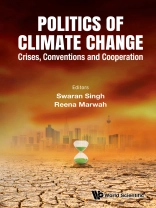The year 2020 was a watershed event in the history of climate change politics. It marked the end of the second commitment period of the Kyoto Protocol and the beginning of the ambitious Paris Agreement. It was also the year of the pandemic, where the disruption caused severe implications on a global scale. The pandemic also brought before the world the severity and scale of the transboundary challenges in a globally interconnected world. It exposed the weaknesses of the global institutions and governance structures in tackling the complex and imminent threat of climate change.
As states prepare for the future of global climate change negotiations post the COP26 event of 2021, there has been a significant shift in the politics of climate change at all levels. The negotiations took place in the shadows of the pandemic, which has challenged the political lethargy and non-committal attitudes of states on the climate change question.
Unlike in the past, climate change is now a hot issue on the political high tables. It has also spilled outside these negotiating spaces and into the public sphere. Whether it is the school strikes led by children or the indigenous struggles of marginalized populations, the politics of climate change today is far more diverse, representative, and active. At the same time, we can witness the shifts in the state’s understanding of the problem, which is actively inquiring about its security and geopolitical dimensions. The boundaries between traditional and non-traditional threats to security are getting blurred as climate change, and its myriad impacts wreak havoc on ecosystem resilience, the state’s welfare capacity, and people’s everyday lives.
Hence, this volume seeks to decipher the nature of global climate change politics in the post-pandemic and climate insecure world. Who will be its main actors, main stakeholders, and losers? How will questions of equity, sustainability, and finance interplay at the COP26 event and thereafter? How will developing and poor countries engage with the issue in the next phase of climate politics? Finally, how will the ambition of the Paris Agreement, which is reflected in the language of net-zero targets and the two degrees Celsius temperature goals, be brought into action?
Contents:
- Politics of Climate Change: Accords and Discord (Swaran Singh and Reena Marwah)
- Issues:
- All Ships Are Not Raised: The Politics of Climate Disasters in the Anthropocene (Saurabh Thakur)
- Climatic Politics of Non-State Actors in the Post-Pandemic Era: Insights from Eco-Cinema of the Global South (Anand Sreekumar)
- Climate Change as a New Area of Sino-Quad Competition: Pacific Islands Perspectives (Artyom A Garin)
- Political Economy of River Ecocide in Bangladesh: A Study in the Context of Dhaleshwari River (Rabby Us Suny, Oliver Tirtho Sarkar, and Md Abid Hasan)
- Challenges of Space Debris and Space Drag: Building an International Climate Change Regime (Swasti Rao and Kunwar Alkendra Pratap Singh)
- Institutions and Initiatives:
- Climate Action by the European Union: Making the European Green Deal a Reality (Kakoli Sengupta)
- International Solar Alliance: Testing a New Framework to Approach Energy Shortage (Claudia Astarita and Julius Hulshof)
- Multilateralism Efforts in Asia: What’s the Way Forward? (Prathit Singh, Namit Mahajan, and Ritvick Khanna)
- Climate Change Narratives with a Focus on India:
- International Climate Governance: Indian Perspectives (Chaitra C)
- Policies as Instruments in Promoting Sustainable Development: Limiting the Climate Change Issues in India (Sheeraz Ahmad Alaie)
- The Impact of Fridays for Future Movement in Indian Politics (Sonia Roy)
- Emerging Indian Partnerships in Climate Change with Special Reference to COVID-19 Era (Aditi Basu)
Readership: Academics and students interested in environmental studies, climate change, climate security and society, Asian Studies, governance, and policy studies.
Key Features:
- Presents a unique blend of theory, policy and initiatives for mitigating the impacts of climate change
- Critiques existing literature and discourses on climate change
- Crystallises ideas about the influence and impact of human actions on natural catastrophes
- Elucidates the narratives in developed and developing countries where people are starting to accept that their actions can contribute to a collective result on a global scale
- Mirrors the synergies required for climate-related action and climate governance and their critical analyses












